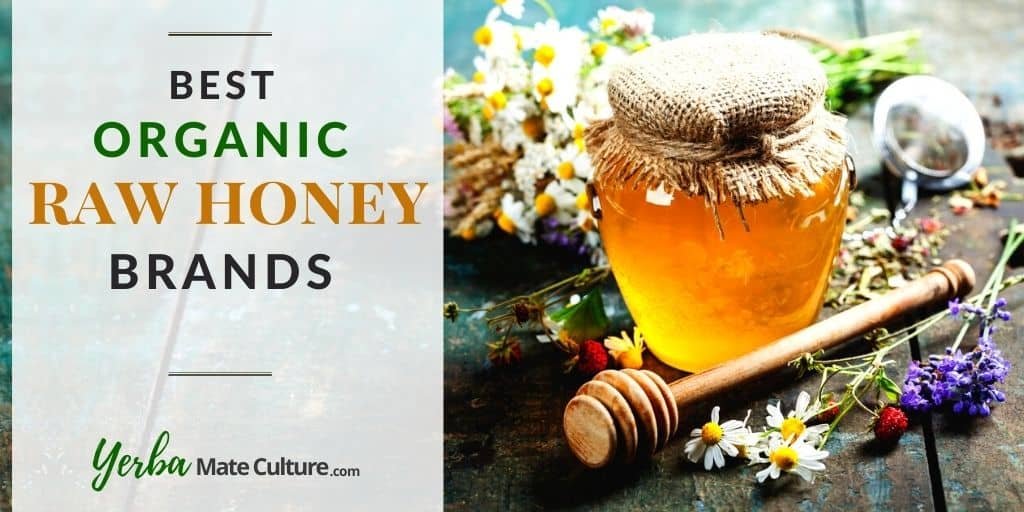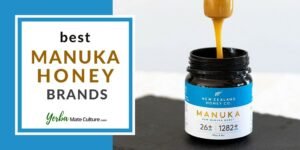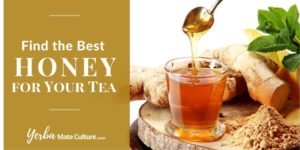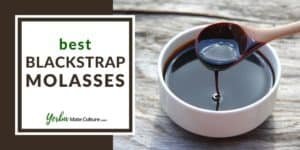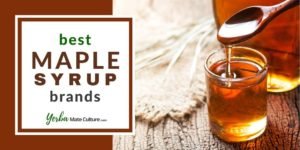Raw honey has been used for centuries by grandmothers everywhere to soothe what ails you. It’s more than just a sweetener — it’s a superfood packed with healthy micronutrients and exciting flavors.
The benefits of raw honey lie in its all-natural goodness. But the more processed it is, the less it has to offer.
Let’s take a closer look at which organic raw honey brands are the most wholesome and what factors impact their quality.
Nature is full of delicious surprises!
Our recommendations for Best Raw Honey:
- Best Overall: Y.S. Eco Bee Farms Organic Raw Unfiltered Honey
- Best Value: Nature Nate’s 100% Pure Organic, Raw, Unfiltered Honey
- Best Manuka: New Zealand Honey Co. Raw Manuka Honey
- Unique Taste: McCoy’s Raw Florida Orange Blossom Honey
- U.S. Desert Honey: Crockett Arizona Desert Wildflower Honey
- Organic & Affordable: 365 by WFM Organic Raw Mountain Forest Honey
- Buy in Bulk: Apiterra Raw Unfiltered Wildflower Honey
Why You Should Buy Organic Raw Honey
Honey is a better sweetener than sugar — it’s more than just empty calories. But only organic raw honey promises maximum flavor and nutrition.
Difference Between Typical Commercial Honey and Raw Organic Honey
Raw honey and your typical commercial honey are very different:
Commercial honey is:
- Pasteurized, which means it’s heated to about 145 F° to kill harmful bacteria and prolong its shelf-life.
- Filtered to remove impurities, so it has a clean, smooth texture and is easy to pack.
- Consistent, so every bottle looks and tastes the same, but filtration and heating take their toll, destroying nutrients and taste.
Raw honey is:
- Never pasteurized, it contains many beneficial compounds, such as enzymes, that are sensitive to heat and would be destroyed in the pasteurizing process. It could also contain bacteria dangerous for children under a year old, but producers work hard to avoid contamination.
- Minimally filtered, it’s thick and contains debris from pollen to propolis — the nutrient-dense glue bees produce to seal their hives.
- Offers more interesting flavors and incomparable nutritional advantages.
Health Benefits
Raw honey has scientifically proven health benefits, including:
Essential Nutrients: Raw honey contains more than 21 vitamins and minerals from magnesium to zinc. It’s an excellent source of Vitamin C, potassium, and cholesterol-busting niacin. An eight-week clinical trial showed that honey can lower levels of bad cholesterol and triglycerides in patients with diabetes.
Antibacterial Effects: Honey kills Staphylococcus aureus and yeast, common culprits in skin infections. Research shows the same Manuka honey used in wound dressings also kills Helicobacter pylori, the bacteria responsible for most stomach ulcers. Used on the skin, it can also help control acne.
Anti-inflammatory Properties: Raw honey is packed with polyphenols, natural compounds that fight inflammation associated with rheumatoid arthritis, high blood pressure, and certain types of heart disease.
Lower Glycemic Impact: The glycemic index ranks foods by how they affect blood sugar. Among popular sweeteners, corn syrup has a sky-high glycemic score of 90 and can cause sharp spikes in glucose levels. White sugar is better at 68. Honey affects blood sugar the least at 61, and it packs a punch of nutrition.
Quiets Coughs: Thick, a tablespoon of honey is proven to coat a sore throat, taming tough coughs as effectively as over-the-counter syrup.
Want to learn more about raw honey and why it’s better than pasteurized?
Check out this video with loads of information about raw honey:
Best Organic Raw Honey Brands Reviewed
We chose the 7 best raw honey brands from hundreds of options in the market. Some products on our top list are not certified organic but were included for their exceptional quality and taste.
All products in this guide are pure, raw, unfiltered honey, so the choice depends on your personal preference on taste and other qualities.
Best Organic Raw Unfiltered Honey: Y.S. Eco Bee Farms Raw Honey
- Amount: 2 x 1 lb
- Type: Organic Raw Unfiltered Honey
Product Highlights:
- 100% pure, natural, unpasteurized and unfiltered
- USDA and OCIA International Organic Certifications
- Rich and sweet flavor
- Fresh from healthy beehives
- Packed in glass jars
Honey doesn’t get much more natural than this. Straight from the hive, it’s raw, pure, unpasteurized, and certified organic. This honey contains all the vitamins, minerals, and antioxidants you expect from a whole food.
Strained but not filtered, it’s thick and creamy with delicate crystals. Certified organic, it’s consistent from batch to batch in texture and taste.
No variety is listed on the label. A product of the US and Canada, it’s likely polyfloral. It has a rich, sweet honey flavor but without heavy notes that could overwhelm a cup of tea.
This honey is packed in food-safe, wide-mouth glass jars. It comes in a pack of two jars, each containing one pound of honey.
If you are looking to save some money, Y.S. Eco Bee Farms also has a more affordable option without organic certification.
Best Value for Money: Nature Nate’s 100% Pure Organic, Raw, Unfiltered Honey
- Amount: 2 lbs
- Type: Organic Raw Unfiltered Honey
Product Highlights:
- Raw, unfiltered, and certified USDA organic
- Complex multi-floral flavor
- Excellent value for money
- OU Kosher certified
Nature Nate’s is a national bestseller. Raw, it’s warmed but never heated to pasteurization temperatures, so beneficial nutrients remain intact. Batches are sourced from the protected rainforests of South America for a complex and exceptional taste.
Ounce for ounce compared to similar brands, it’s our best value.
All of Nature Nate’s honey is independently certified, and the supply chain is transparent from start to finish. This product is USDA certified organic and there is also a non-certified version available.
Nature Nate’s was awarded the ChefsBest Excellence Award for its superior quality.
Buy it in a 32-ounce BPA-free plastic bottle or a 16-ounce no-mess echo-friendly pouch. Competitively priced, the larger bottle is the most economical.
Best Manuka Honey: New Zealand Honey Co. Raw Manuka Honey
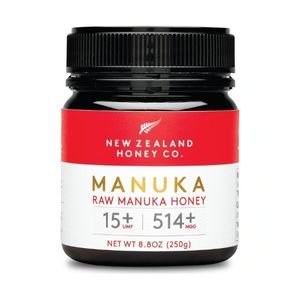
- Amount: 8.8 oz (also available in 1.1 lb / 500g jar)
- Type: Raw Manuka Honey
Order directly from New Zealand Honey Co. for free shipping and fast delivery:
Product Highlights:
- 100% genuine – foraged, harvested, packed, and tested in New Zealand
- Has powerful medicinal properties
- Strong and earthy flavor
- UMF Certified – UMF 15+ and 514+ MGO
- PETE recyclable and BPA free jars
Meet one of the rarest kinds of honey on Earth. Prized for its dense nutrition and antibacterial properties, Manuka is a superfood in the truest sense of the word.
Fudgy in texture, it’s rich in flavor with notes of chocolate and wood. It’s less for use in baking than by the spoonful in tea for its flavor and health benefits. Smoothed on skin, it has healing properties.
The New Zealand Honey Co. Manuka Honey is third-party tested and certified to meet the highest standards based on the UMF grading system that ensures its authenticity and potency — this product is that valuable.
Scores are based on the concentration of Manuka-specific chemicals. This product is rated Ultra Premium, the second-highest grade.
Available in 1.1-pound and 8.8-ounce food-safe plastic jars with wide mouths for easy scooping, this honey is expensive but consistent with its quality. If you’ve never tried Manuka before, this brand is your best bet.
Unique Citrus Flavor: McCoy’s Raw Florida Orange Blossom Honey
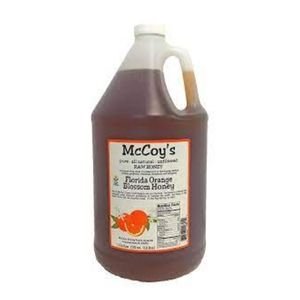
- Amount: 6 lbs
- Type: Raw Unfiltered Honey
Product Highlights:
- Produced by bees that live in orange groves
- 100% made in the U.S.A.
- Sweet flavor with a hint of citrus
- Excellent for making mead
There’s no better honey for the citrus-lover than McCoy’s Florida Orange Blossom Honey. High in antioxidants, it’s never imported — they own the apiaries and know exactly what goes into every jug. They’ve been producing it since 1943, hand-delivering bees to the groves to feed.
McCoy’s isn’t certified organic, but it’s pure, raw, and unfiltered, containing all the pollen, propolis, vitamins, and minerals the bees put in. Light in flavor but very sweet with a snappy orange tang and delightful aroma, it tastes like it was custom-made for Earl Grey.
For home brewers, nothing makes better mead.
The slightly higher price point reflects the care that goes into each batch — you’re in for a treat. It’s only available in six-pound plastic jugs, but it’s versatile and guaranteed to disappear in no time.
Superb U.S. Desert Honey: Crockett Raw and Unfiltered Arizona Desert Wildflower Honey
- Amount: 3 lbs
- Type: Raw Unfiltered Honey
Product Highlights:
- Wild raw honey from the U.S.
- Sustainably sourced from the Sonoran Deserts
- Mild and delicate flavor
- Rich in flavonoids and phenolic acid
Crockett’s raw honey is sourced from the Sonoran Desert along the majestic Colorado River. It’s unpasteurized, minimally strained, and comes from wildflowers in remote areas that are unlikely to be treated with pesticides. It’s not certified organic, but it’s probably close.
Sweet but with a light, neutral taste, it lends itself well to a variety of uses from cooking to sweetening tea. If you like old-fashioned honey flavor, this is it.
It comes in 3-pound pound plastic bottles with a small cap that’s beneficial for keeping air out, but it’s inconvenient for scooping. Still, it’s delicious, nutritious honey at an affordable price for the budget-conscious shopper. We couldn’t ask for more.
Organic and Affordable: 365 by Whole Foods Market Organic Raw Mountain Forest Honey
- Amount: 1 lb
- Type: Organic Raw Unfiltered Honey
Product Highlights:
- USDA Certified Organic and US Grade A
- Very affordable
- Thick with a distinctive flavor
- Certified Kosher and Fair Trade
Whole Foods Mountain Forest Honey has a caramel-like texture and richer-than-average taste. Amber in color, it’s sweet but with a contrasting herb-like flavor that blends well with tea. Raw and certified organic, it’s sourced from Brazil and Mexico.
“Mountain Forest” doesn’t clearly describe the nectar source, so its health benefits are tough to pinpoint, but it’s minimally processed and nutrient-dense. Strained only for consistency, expect small crystals and obvious bits of pollen.
Available in a 16-ounce, wide-mouth jar for a surprisingly fair price, it’s a good buy and an excellent choice for the honey-lover who wants to foray into different flavor profiles. We recommend it with breakfast tea.
Buy in Bulk: Apiterra Raw Unfiltered Wildflower Honey
- Amount: 8 lbs
- Type: Raw Unfiltered Honey
Product Highlights:
- 100% pure and natural raw wildflower honey
- Available in large drums up to 34 lbs
- Good price per ounce (especially in large amounts)
- Creamy spreadable texture and mild wildflower flavor
Apiterra honey is harvested straight from the hive — it’s never heated or filtered. You get healthy pollen, propolis, and antioxidants in every bite.
Made from wildflowers, its taste can vary from season to season. It is consistent enough to count on but never boring.
This honey has a bright flavor and a soft but grainy texture that’s always a hit with the kids. Creamy, it’s the perfect spread for cornbread.
Imported from sustainably kept hives in Belarus, Apiterra honey is not certified organic but it has a sound reputation for unadulterated quality. It’s available in 1.37-pound wide-mouth jars or bargain-priced buckets in bulk sizes from 6-34 pounds.
What to Consider When Buying Organic Raw Honey
How honey is sourced, produced, and packaged has an impact on its quality. Consider these factors as you shop.
Filtering Process
The USDA defines two styles of processing:
- Filtered honey is honey that has been filtered to the extent that all or most of the fine particles have been removed.
- Strained honey is defined as products strained to the extent that most of the particles have been removed except grains of pollen, air bubbles, and other very fine particles.
Honey labeled unfiltered is the least processed and retains most of its natural character.
The least filtered brands may be the most nutritious, but they can be harsh tasting and difficult to spread, containing large particles from chunks of beeswax to wings. Most unfiltered honey is strained just enough to improve its consistency and remove unpleasant substances.
Packaging
Honey comes in a wide range of creative packaging from plastic and glass jars to tubs, tubes, and buckets. Glass is a popular choice because it’s inert and won’t leech chemicals into your honey, but it’s breakable and doesn’t travel well. Most imported honey is packaged in food-safe, BPA-free plastic.
Jars with wide-mouth lids are a plus for scooping out honey that’s too thick or crystallized to pour. You don’t want to waste a drop.
Nectar Source
Honey is classified by the type of flowers from which bees collect nectar. Its taste, texture, and health benefits are unique to the plant.
Bees that eat clover, the most common food source in the US, produce light and fruity honey known for its antioxidant properties. Bees feeding on the Manuka bush produce rich, dark honey with an antiseptic flavor and powerful antibacterial effects.
Some varieties are polyfloral, like wildflower honey, so taste consistency and health benefits may vary.
Producing varietal honey requires strict quality control. Bees can travel thousands of miles in search of nectar, so beekeepers must know when the desired flowers are in bloom. Production windows can be as short as a few days for some types, so expect to pay more for unusual flavors.
Producers aren’t required to label the floral source, but if they do, they must have rock-solid supporting documentation.
Label Terms
Raw, organic, and pure are three common terms on honey labels. Let’s find out what they mean.
- Raw means that honey is unpasteurized. It may be warmed to make straining, filtration, and packaging easier, but it’s never heated to temperatures high enough to kill bacteria or destroy healthy enzymes.
- Organic honey is produced from organically grown flowers. Hives are located within a two-mile radius of organic-only crops. Any pesticide treatment for bees or hives must be all-natural. Only certified organic honey is guaranteed to be chemical-free, but the certification process is so costly and challenging that some companies rely on their reputation versus certification.
- Pure honey means a product is 100-percent honey and hasn’t been cut with other ingredients such as corn syrup. Products with added ingredients can’t be labeled pure.
Honey can be raw but not organic and pure but not raw or unfiltered. Consider your purchasing criteria and make sure each is clearly listed on the label.

